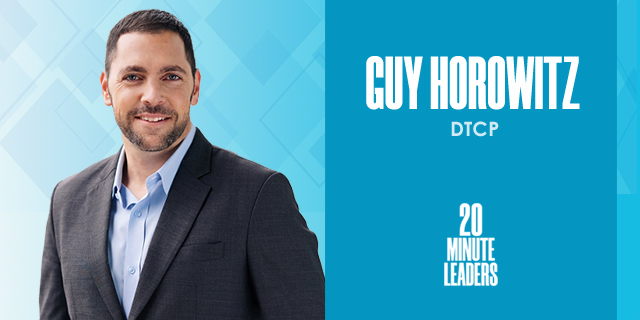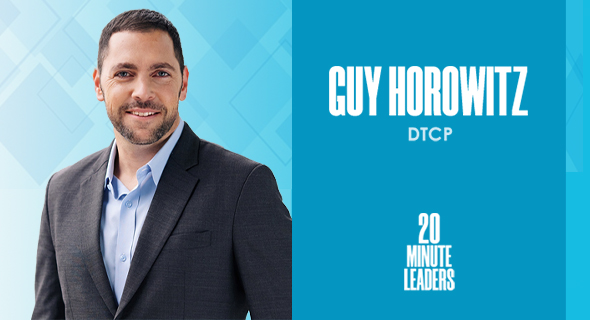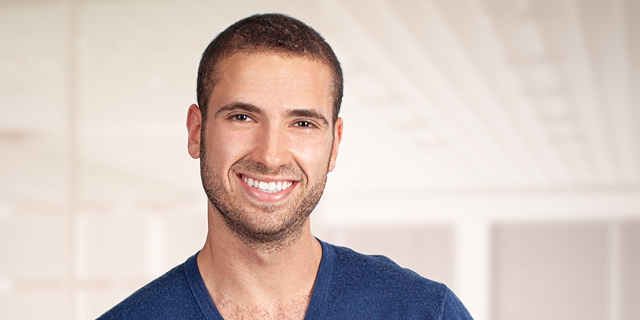
20-Minute Leaders
“You've got to have this mix of passion and something that comes from the soul rather than just money.”
Working hard at a day job and finding time to fulfill his passion is a balance Guy Horowitz, partner at DTCP, seeks to find.
Click Here For More 20MinuteLeaders
Guy, tell me a little bit about yourself.
I was born and raised in Israel. I spent a few years here in the U.S. I went back to do military service in Israel. Life decided for me that I was going to stay in Israel. I was part of a startup back in '98. I was basically doing WhatsApp. The apps world did not exist at the time, so we had to sell to carriers. I learned you don't want to work with carriers. In 2004, I joined a great VC in Israel called Gemini. I also worked for Microsoft for a short bit.
Take me to the ’90s in the tech ecosystem. That's my life now. This is what's around me. This is what's sexy. Was it the same feeling then?
I started college in ’92 and we had computers all over. Then I went to do military service where we had zero computers. After that, I felt like I missed the train. Everyone was already literate, and I was illiterate. I think everyone felt this thing was going to change the world. But not necessarily in the same way we think of it today.
At my first startup, we did direct-to-consumer e-learning. We ended up selling that to a B2B type entity. The world took the shift toward B2B, and I was just there at the right time.
In 2012, I got to run a local outpost for a German company called Deutsche Telekom. We had R&D; we had business development. There was a bit of venture. I was frustrated. I expressed those frustrations to the CEO of Deutsche Telekom. Fortunately, someone else in the organization was thinking along the same lines. We ended up doing this thing called DTCP, which is now a multi-LP fund.
Before we get into what you do with DTCP, tell me about your work as an artist and a musician.
Firstly, it's an outlet. For everyone working in tech or venture, you need to have something that's not just the race. We need to relax and wind down. I'm in an Israeli band in Silicon Valley. We're all tech people and in ventures, and we gather on Sundays to do rock covers.
It's actually the product market fit for covers. Especially Israeli covers in Silicon Valley. We found this thing people want to listen to. There are not too many rock people in Silicon Valley singing in Hebrew.
In reality, there are many great singer-songwriters who do not get to the primetime to become unicorns of music. Sometimes product market fit is as important, if not more important, than being this brilliant singular snowflake.
Tell me a little bit about that sense of fulfillment.
I think it's a matter of balance. First, there's a day job and you've got to put your effort into that. But you've got to have this mix of passion and something that comes from the soul rather than just the monetary side. I think that's true for every startup and in venture capital.
For me personally, in COVID, it was also a revelation. There is social media where you can actually get to people. Getting those calls and those messages from people is actually almost as satisfying and gratifying, especially if you have a day job that pays well.
Tell me a little bit about DTCP. How do you reason through the investment world today?
We started in 2015. Our thesis was always enterprise SaaS. We started with omni-stage and gradually gravitated toward the later stages. The world has also gone in a different direction than we thought. Companies that have great units of measure, great KPIs, in the top criteria out there are actually going to outperform everyone. As investors, we want to be there. If you look at our portfolio today, we're very KPI-driven and metrics-driven. We've built a tool and an analysis platform that allows us to basically select the top of the crop. We're not going to be able to invest into every one of them. But if we are able to invest into one of those, it's going to do so much better than your average okay plus company.
How early do you go, both in terms of making the relationship and you having enough time to actually analyze?
It's getting harder, and you need to start looking earlier like everyone else. We do start talking to these companies earlier. Once you have four or five quarters of growth under your belt, that's where our tools would work better.
Your value creation team is probably the most important team in your organization because that's a differentiator. That's the secret sauce. Many of those companies, both in Israel and here in the U.S., are lacking in Europe. They're lacking the ability to know when's the right time to go into Europe.
Also in Europe, when you have a French company, they're not as conversant about Germany as you'd think. Everyone sees their own world and the U.S.
We managed to find this happy place where our investors, our LPs and their network and constituents are our best friends when it comes to taking their companies to the market and helping them lubricate the processes that typically take years and different languages in different geographies. We help with that.
Many entrepreneurs are waking up to the realization that the European market has been neglected. Many of the CEOs and CROs in our portfolio have not spent much time thinking about Europe. That's how we create and manage a conversation in a very early stage, even if we are not investing at that point.
What is the initial reception that founders may have?
Not all of them have the same reception. But a typical entrepreneur would probably say, "Oh, the name rings a bell."
I think we're still affiliated in people's minds with Germany, which is not bad. It reminds people that we're different and that you might be able to bring strategic value. Think of it, as the entrepreneur, "Am I strategic to you?" They say, “My strategy is to expand into Europe. You are helping me with that, hence you are strategic to me.”
The other thing is obviously money. We are able to write bigger and bigger checks. Being able to get a double digit million check from a strategic investor that helps you with something different is unique.
There's so many different things that you do. Which part really resonates with Guy Horowitz?
The original Guy Horowitz is a product guy. For me, if we offer a product to the customers, which are the startups, that is unique and of high quality and consistently so, we're going to do well. Where we excel is where we bring unique value. That's around that ability to go to market and touch it in a different way. That's our product market fit.
In middle or elementary school, what really sparked your curiosity?
I'm a missed architect or a car designer. People who remember me from those days remember my notes being filled with all sorts of drawings. Every building, every car, everything that's like a combination of art and science, engineering meets art, that makes me want to do it.
If I were to ask any of your partners, band members, or entrepreneurs who Guy Horowitz is, what do you think they would say?
Dreamer. Keeping my dream alive while doing all those things that are the brick and mortar, the bread and butter. I think dreaming is a very big part of who I am.
Michael Matias, Forbes 30 Under 30, is the author of Age is Only an Int: Lessons I Learned as a Young Entrepreneur. He studies Artificial Intelligence at Stanford University, is a Venture Partner at J-Ventures and was an engineer at Hippo Insurance. Matias previously served as an officer in the 8200 unit. 20MinuteLeaders is a tech entrepreneurship interview series featuring one-on-one interviews with fascinating founders, innovators and thought leaders sharing their journeys and experiences.
Contributing editors: Michael Matias, Megan Ryan

